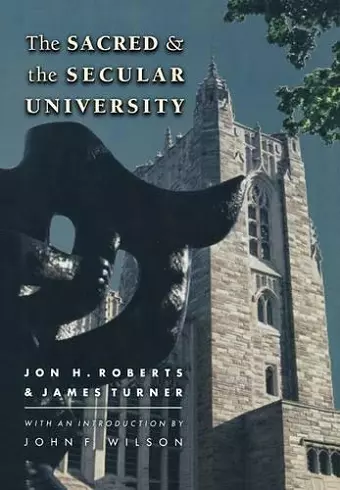The Sacred and the Secular University
James Turner author Jon H Roberts author John Frederick Wilson editor
Format:Hardback
Publisher:Princeton University Press
Currently unavailable, and unfortunately no date known when it will be back

A brief, highly readable survey of the de-Christianization of the American academy that should attract a wide readership among historians of education, science, and religion. -- Ronald Numbers, University of Wisconsin The issues of religion in public life and the role of religion in colleges are receiving a lot of attention today. This book makes a significant contribution to those discussions. -- Wayne Proudfoot, Columbia University
American higher education was transformed between the end of the Civil War and the beginning of World War I. This work identifies the forces and explains the events that reformed the college curriculum during this era. It also examines how the study of science became detached from theological considerations.American higher education was transformed between the end of the Civil War and the beginning of World War I. During this period, U.S. colleges underwent fundamental changes--changes that helped to create the modern university we know today. Most significantly, the study of the sciences and the humanities effectively dissolved the Protestant framework of learning by introducing a new secularized curriculum. This secularization has long been recognized as a decisive turning point in the history of American education. Until now, however, there has been remarkably little attention paid to the details of how this transformation came about. Here, at last, Jon Roberts and James Turner identify the forces and explain the events that reformed the college curriculum during this era. The first section of the book examines how the study of science became detached from theological considerations. Previously, one of the primary pursuits of "natural scientists" was to achieve an understanding of the workings of the divine in earthly events. During the late nineteenth century, however, scientists reduced the scope of their inquiries to subjects that could be isolated, measured, and studied objectively. In pursuit of "scientific truth," they were drawn away from the larger "truths" that they had once sought. On a related path, social scientists began to pursue the study of human society more scientifically, attempting to generalize principles of behavior from empirically observed events. The second section describes the revolution that occurred in the humanities, beginning in the mid-nineteenth century, when the study of humanities was largely the study of Greek and Latin. By 1900, however, the humanities were much more broadly construed, including such previously unstudied subjects as literature, philosophy, history, and art history. The "triumph of the humanities" represented a significant change in attitudes about what constituted academic knowledge and, therefore, what should be a part of the college curriculum. The Sacred and the Secular University rewrites the history of higher education in the United States. It will interest all readers who are...
One of Choice's Outstanding Academic Titles for 2000 Winner of the Thomas N. Bonner Prize "A handy historical overview of an issue that cannot be dismissed as "academic," because it is just too important for understanding who we are and where we are going."--Peter Heinegg, America "The Sacred and the Secular University is a balanced and well-reasoned contribution to one of the major themes of American higher education. Full of drama, characters, and plot ... [it] provides insights into what may be the defining movement within American higher education history."--J. Gregory Behle, History of Education Quarterly "This is a masterful study. In a mere 122 pages of text, it gets to the heart of the secularizing impulse in higher education. This is intellectual history at its finest, written in engaging, accessible ... and witty prose about matters that are central to intellectual life. For those of us who live in the academy, this is our history. It should be required reading."--Joel A. Carpenter, American Historical Review "This concise, well-argued book offers an important glimpse into the historical production of knowledge and the changing place of religion in the university."--Amy Johnson Frykholm, Religious Studies Review
- Short-listed for Choice Magazine Outstanding Reference/Academic Book Award 2000
ISBN: 9780691015569
Dimensions: unknown
Weight: 425g
184 pages